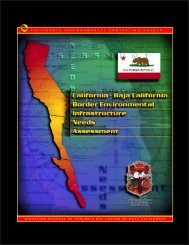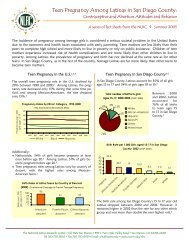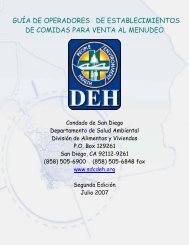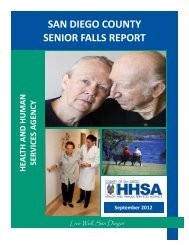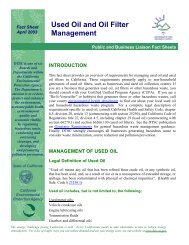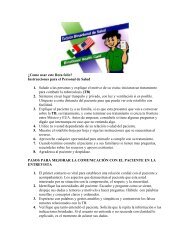United States-Mexico Border Health Commission Annual Report 2003
United States-Mexico Border Health Commission Annual Report 2003
United States-Mexico Border Health Commission Annual Report 2003
You also want an ePaper? Increase the reach of your titles
YUMPU automatically turns print PDFs into web optimized ePapers that Google loves.
Binational Tuberculosis Referral and Case Management Pilot Project<br />
Statistics show that almost a quarter of all foreign-born TB patients in the <strong>United</strong> <strong>States</strong><br />
are from <strong>Mexico</strong>. These patients also have a higher rate of drug resistance and their<br />
mobility makes case management difficult. In response to this serious health problem, the<br />
Binational Tuberculosis Referral and Case Management Pilot Project, supported by the<br />
<strong>Commission</strong> and implemented by the Centers for Disease Control and Prevention (CDC)<br />
and the <strong>Mexico</strong> National TB Program, was launched on March 27, <strong>2003</strong> during the<br />
World TB Day Observance held in El Paso, Texas, Las Cruces, NM, and Ciudad Juárez,<br />
Chihuahua. The event, which was convened by the USMBHC, the CDC and the<br />
Secretaría de Salud, carried the theme: No TB on our <strong>Border</strong>s: Now is the Time! /¡No<br />
a la TB en Nuestras Fronteras: Ahora es el Momento! More than 130 participants, who<br />
are committed to the success of this binational health initiative, attended the event. A<br />
wallet-sized Binational <strong>Health</strong> Card, with distribution initiated on April 1, <strong>2003</strong>, will<br />
integrate the U.S programs, such as CureTB and TBNet, and link their referral services<br />
directly with the Mexican National TB Program. The system is being piloted in the sistercity<br />
regions of San Diego, Calif./Tijuana, Baja California; and in El Paso, Texas/Las<br />
Cruces, NM/Cd. Juárez, Chihuahua. Cards are also being distributed in Matamoros,<br />
Tamaulipas, and seven additional states in <strong>Mexico</strong> (Michoacán, Jalisco, Veracruz,<br />
Oaxaca, Coahuila, Sonora and Nuevo León) known to be the places of origin of many<br />
Mexican migrants to the <strong>United</strong> <strong>States</strong>. The goal of the project is to ensure the continuity<br />
of care and the completion of treatment for TB patients, who travel between the <strong>United</strong><br />
<strong>States</strong> and <strong>Mexico</strong>, and to prevent the spread of TB. The Binational <strong>Health</strong> Card will<br />
facilitate referral of patients between the health systems of the two countries. The card<br />
has a U.S. and <strong>Mexico</strong> toll-free telephone number, a confidential identification number,<br />
information about the patient’s origin of treatment, treatment regimen and whether the<br />
patient received directly observed therapy. Special consideration has been paid to<br />
safeguarding patient confidentiality during the international exchange of information. An<br />
unprecedented level of cooperation among approximately 42 organizations support this<br />
pilot project, which represents the long-term commitment by the <strong>Commission</strong> to the<br />
elimination of tuberculosis. It is hoped that this project will serve as a model for other<br />
disease management programs along the border and worldwide.<br />
28



